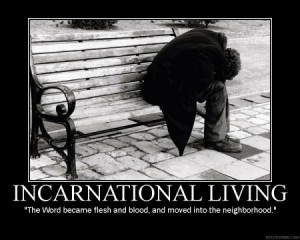 I was all for being missional before it was cool. I led a ministry in college designed to help students think of themselves as “domestic missionaries,” and have tried to approach my ministry in a way positions Christ following as a radical way of life that must be translated into the pluralistic, postmodern, pre-Christian United States.
I was all for being missional before it was cool. I led a ministry in college designed to help students think of themselves as “domestic missionaries,” and have tried to approach my ministry in a way positions Christ following as a radical way of life that must be translated into the pluralistic, postmodern, pre-Christian United States.
Many great discussions about God’s mission in the world, and the purpose of the Church are helping to refocus the church, however, like any other terminology, missional has been quickly co-opted to mean whatever you want it to mean. For some it means rebranding seeker-driven formats of the 80s and 90s. For others it means rationalizing a focus of social justice at the expense of personal morality and evangelism.
Ever since being blown away by Dallas Willard’s The Divine Conspiracy I haven’t been able to get past the idea that Churches should exist to teach people to live as Christ would if he were them. What if we just took simple ideas like “don’t hate other people” or “trust God” or “eat with people who don’t look like you” and formed sermon series, youth ministries and Sunday School classes around them?
Call me simplistic, but I’m operating from the belief that important doctrinal issues can only be worked out once you really love Jesus, are following him, and are being transformed into his image. Focusing on the life of Jesus and his teachings would, in turn, make us naturally missional, and maybe even take the focus off some other arguments we Christians keep having.


 I spent the first half of the week serving
I spent the first half of the week serving  Phyllis Tickle’s The Great Emergence is a deceptively short and easy-to-read breakdown of the current state of North American Christianity. Tickle’s senior citizenship and long time experience as religion editor for Publisher’s Weekly, allows her to levitate above the fray of the modern-hyper-calvinists vs. the pomo-emergents. Her thesis is that every 500 years, Christianity has a garage sale, and we’re in the middle of one right now.
Phyllis Tickle’s The Great Emergence is a deceptively short and easy-to-read breakdown of the current state of North American Christianity. Tickle’s senior citizenship and long time experience as religion editor for Publisher’s Weekly, allows her to levitate above the fray of the modern-hyper-calvinists vs. the pomo-emergents. Her thesis is that every 500 years, Christianity has a garage sale, and we’re in the middle of one right now.





 Tweets
Tweets